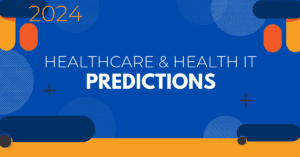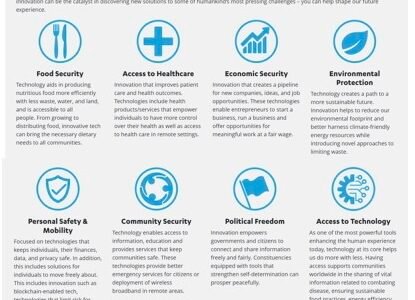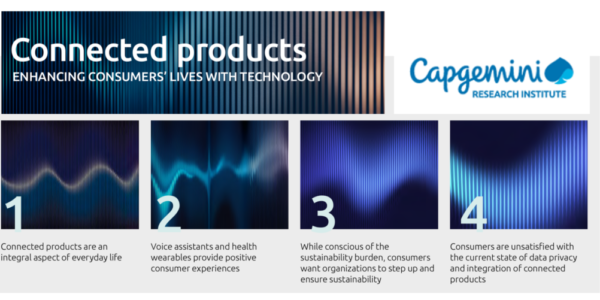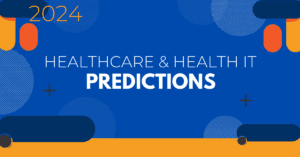Healthcare Workforce – 2024 Health IT Predictions
As we kick off 2024, we wanted to start the new year with a series of 2024 Health IT predictions. We asked the Healthcare IT Today community to submit their predictions and we received a wide ranging set of responses that we grouped into a number of themes. In fact, we got so many that […]
Access to Technology Is the New Pillar for Well-Being: CES & the UN Partner for Human Security for All
In kicking off #CES2024, CTA’s researchers noted the acceleration of global connectivity, with gaps in peoples’ ability to connect depending where they live: by region, the percent of people connected to the internet today are, according to CTA’s data, 92% in the U.S. 87% in the E.U. 76% in Latin America 73% in China 55% in Nigeria 46% in India. Such gaps in connectivity threaten peoples’ individual well-being, but also social and political stability that impacts the entire world’s security. And not to overlook, as well, the promise of AI to do good at scale at the enterprise-level, globally. Recognizing the importance of connectivity and the over-arching need for peoples’ access to technology overall, CES is collaborating with the United Nations Trust Fund for Human Security (U.N.) and the World Academy of Art and Science (WAAS), on a program to safeguard Human Security For All — HS4A. Last year, I wrote about this program’s seven pillars for human security in the context of industry announcements from John Deere (related to food security), L’Oreal (for personal safety and mobility), and MedWand (for access to healthcare). In addition to these three factors, the additional four related to economic security, environmental protection, community security, and political freedom, shown in the first graphic. Enter pillar #8: Access to Technology. As the text beneath this eighth pillar explains, “As one of the most powerful tools enhancing the human experience today, technology at its core helps us do more with less. Having access supports communities worldwide in the sharing of vital information related to combating disease, ensuring sustainable food practices, energy efficiency, access to clean water, and so much more.” Some of the exhibitors collaborating in the HS4A showcase include Abbott, AARP, Bosch, Nasdaq, and Siemens. Couple this with the sustainability companies working on accessibility, energy, food-tech, smart cities, and clean water, and we find CES convening a meeting that is working hard to walk the talk about “inclusion.” Health Populi’s Hot Points: From the start of the coronavirus pandemic in early 2020, one thing became clear: that people living in households without connectivity were unable to work from home if they had a job that supported virtual work, attend school from home, or connect to loved ones, friends, and communities from home. In 2017, a few years before we uttered “Covid” or “PPE,” I wrote about broadband connectivity as a social determinant of health in the Huffington Post. The pandemic made it all the more obvious to most people. In the first six months of the pandemic, I collected all kinds of data about how consumers’ behaviors were adapting to the repurposing of homes for living, working, educating, praying, cooking and baking (sourdough breads posted on Pinterest), exercising, and socializing….all, through videoconferencing sites like Zoom and Microsoft Teams, and FaceTime and WhatsApp on smartphones. I added Wi-Fi as a basic human need on Maslow’s Hierarchy, included in my book Health Citizenship, with digital connectivity and privacy rights a pillar of being a full-on health citizen. I quote from the (Bertrand) Russell-(Albert) Einstein Manifesto from July 1955 — two of the founders of the World Academy of Art and Science, “We appeal as human beings, to human beings: Remember your humanity, and forget the rest.” For more on HS4A, download the new 2024 Technology as a Force for Good paper here. Onward…
The post Access to Technology Is the New Pillar for Well-Being: CES & the UN Partner for Human Security for All appeared first on HealthPopuli.com.
Certainly Health Raises $2.3M in Funding to Enable Consumers to Book Any Doctor With Upfront Prices
First-Of-Its-Kind Marketplace for Insured Patients to Book Health Providers Without Surprise Bills Certainly Health, a healthcare marketplace for booking medical and cosmetic care with upfront prices, announces today that it has received $2.3M in funding led by Pacific 8 Ventures, Y-Combinator, and other institutional and angel investors. The new infusion of capital will be used to expand […]
Navigating the Path to AI Adoption in Healthcare: 5 Steps for Success
The following is a guest article by Archie Mayani, Chief Product Officer at GHX Artificial Intelligence (AI) has been a game-changer in various industries, but its integration into healthcare has been a more gradual process. While healthcare has undoubtedly made strides in harnessing AI’s potential, there’s still ample room for growth and development. The pandemic […]
Pharmacy Interoperability and Pharmacy Perspectives Coming Out of the ONC Annual Meeting
It never ceases to amaze me how integral the role of the pharmacist could be to a patient and how many pharmacists are relegated to counting pills and checking insurance. I first experienced this in my first healthcare job which included handling IT support for the pharmacy. Yes, the pharmacist has to make sure the […]
Healthcare Interoperability, Data, and Cloud – 2024 Health IT Predictions
As we kick off 2024, we wanted to start the new year with a series of 2024 Health IT predictions. We asked the Healthcare IT Today community to submit their predictions and we received a wide ranging set of responses that we grouped into a number of themes. In fact, we got so many that […]
Mainstreaming the Connected Life, with a Side of Trust — Insights from Capgemini at the Start of #CES2024
Even with serious concerns about personal data privacy and lack of integration, “connected products” are an integral aspect of peoples’ everyday lives. That’s the central thesis in a timely report from Capgemini Research Institute, Connected products: Enhancing consumers’ lives with technology. This study is well-timed as we begin a week-long exploration into the latest technology innovations being unveiled at CES 2024, the annual mega-conference hosted by the Consumer Technology Association (CTA). For the consumer research, Capgemini’s team polled the perspectives of 10,000 consumers age 18+ in November, among people from 13 countries: Australia, Canada, France, Germany, India, Italy, Japan, the Netherlands, Norway, Spain, Sweden, the UK, and the U.S. To get us thinking on the same page, first, what is a “connected product?” Capgemini defines this as any product that can connect to the Internet. Hint: if it has an app associated with it, it’s probably a connected product. Thus, the research assesses consumers’ use and affinity for devices beyond smartphones and tablets, further explained below. The big takeaway is the mainstreaming of connected products shown in the first bar chart: two in three consumers across the 13 countries sampled believe connected devices are becoming a necessity and part of my lifestyle. One-half of people find these products give us a view of our routines and help us better understand ourselves. One-third of people say they use connected products nearly 24 hours a day and more think they will own even more connected products one year from now (good news for CES 2024 exhibitors!). And what might those products be? Start with the smart home security category closely followed by health wearables and tracking tools, connected vehicles, home utility equipment, smart kitchen devices, and connected speakers (voice assistants, already very popular devices in connected homes). Watch for that smart pet care category to grow, here showing 14% of global consumers likely to buy some product in the segment in the next 12 months. The most impactful connected products have on health, safety, and time management are health wearables and trackers to help us stay healthier, as well as smart home security systems that help us feel safer. Health Populi’s Hot Points: Looking forward….health, safety, and security are the aspects of connectivity consumers are seeking in the next twelve months….with niche categories that will grow, too, depending on peoples’ lifestyles and home situations. Given the nature of health, safety, and security, the connected device community must stay mindful about trust — and just how much data and what kind consumers would be willing to share for health compared with, say, entertainment. Figure 22 from the report lays out these two questions, with important distinctions between health vs. entertainment. General demographic data is fair game to be shared for both health and entertainment. Location data would be shared by most people for health, but not so much for entertainment. And so on… It turns out, based on Capgemini’s survey data, that most consumers who have had positive experiences from health wearables have placed higher trust in that company serving up the device. This experience with health wearables has two key dimensions: first, the actual data privacy and security provisions, assurances, and delivery on the privacy promise; and second, the experience in setting the device up, pairing it for use (via app), and ongoing streamlined design and use of the technology delivering actionable solutions to the consumer, patient, and caregiver. Both these aspects of experience bolster trust with connected health devices — and the companies who channel and develop them. We will keep these learnings in mind as we explore the convention floor(s) at #CES2024….thanks to Capgemini for the important and timely findings.
The post Mainstreaming the Connected Life, with a Side of Trust — Insights from Capgemini at the Start of #CES2024 appeared first on HealthPopuli.com.
Volpara Health Enters Agreement to be Acquired by Lunit, Inc.
Volpara Health Technologies (Volpara), a global leader in software for the early detection of breast cancer, is pleased to announce it has entered into an agreement to be acquired by Lunit Inc. Under the terms of the agreement, Lunit would acquire all shares of Volpara stock for A$1.15 per share in cash, representing a 47.4% premium […]
Here’s What to Expect from IoMT Cybersecurity in 2024
The following is a guest article by Shankar Somasundaram, CEO at Asimily Healthcare delivery organizations (HDOs) continue to be up against a fast-moving landscape trying to keep up with and mitigate cybersecurity threats to medical technology. But even setting aside the immense challenge of safeguarding Internet of Medical Things (IoMT) devices from increasingly sophisticated and […]
Pharma IT and AI – 2024 Health IT Predictions
As we kick off 2024, we wanted to start the new year with a series of 2024 Health IT predictions. We asked the Healthcare IT Today community to submit their predictions and we received a wide ranging set of responses that we grouped into a number of themes. In fact, we got so many that […]









